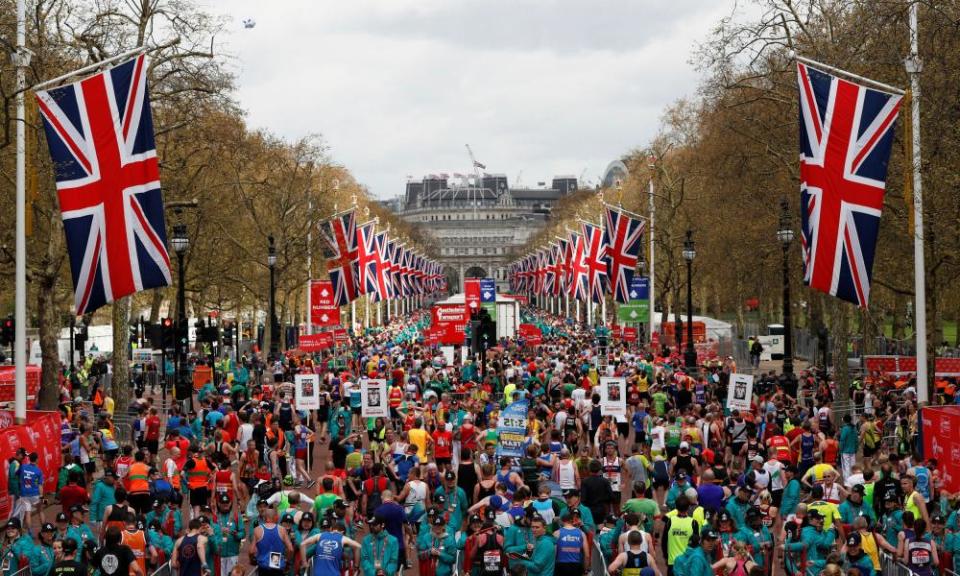London's virtual long-distance runners will never be lonely in spirit

There is a day in the sporting calendar that I can guarantee will put a wide smile on my face – in fact, I can time the moment it happens to the nearest minute. It comes at 7.01pm on the last Sunday of April as I head towards Green Park tube station at the end of a long day covering the London Marathon. Without fail there are runners being propped up by friends, their walks now a waddle, having got around the 26.2-mile course in five or maybe six hours. In truth it looks like a scene from 28 Hours Later. But do you know what? You can see the scale of the personal achievement etched on every single face; the totality of their effort on each sweat-drenched charity vest.
There are bigger sporting events, to be sure. But not many that enrich the soul like the London Marathon. Next Sunday my admiration for all the everyday runners taking part in this race will be even greater than usual.
For while the elite athletes will charge around a loop of St James’s Park almost 20 times watched by millions on TV, 45,000 people from more than 60 countries will be running 26.2 miles virtually, on a course of their choice, without 750,000 or so spectators creating a wall of sound along the way.
Given the enormity of the pandemic, it is perhaps grimly appropriate that the world’s biggest marathon has also gone global. Yet rarely will the loneliness of the long-distance runner have felt more stark.
But the fact that the event is being staged at all, and with many of the world’s best athletes – including the world record holders Eliud Kipchoge and Brigid Kosgei – is a cause for quiet celebration. Because let us be frank here, the pandemic has exposed many painful truths about British exceptionalism. Six months on, the UK has the worst overall death rate in Europe. It still lacks an effective track and trace system. It has repeatedly failed to learn lessons from other countries. Its strategy, such as it is, oscillates between the slapdash and the straitjacket, bumbling and wishful thinking. Moonshots? That only brings to mind those rockets from the embryonic days of the space race, which spluttered off their stands, before briefly pirouetting and bursting into flames.
Yet in the London Marathon, Britain really does have an undisputed world-beating success story. And, in the midst of these troubled times, its organisers have found a way to stage the event in a way that preserves that unique bond between the elite and the everyday.
Related: London Marathon prize money cut nearly in half but fund made for Britons
Unsurprisingly, there have been a few bumps on the way. Initial plans to hold a mass-participation event using “revolutionary” Bluetooth technology to safely allow 45,000 competitors to socially distance had to be shelved following a spike in coronavirus cases in the UK. Instead those runners will run the race virtually, logging their runs on a dedicated app.
From Monday, meanwhile, the elite runners and their coaches will enter a biosecure hotel, one with 40 acres of its own grounds. The London Marathon’s operations director, Andrew Smith, tells me that all sorts of safety precautions are in place for the week – including athletes having their own individual changing areas and a dedicated toilet on race-day itself.
It will be a very different marathon for these very different times. Yet when the 40th race begins at 7.15am on Sunday, it will be an opportunity to reflect on how far the event has come. It was back in 1979 that Chris Brasher, the then athletics correspondent of the Observer, returned from running the New York Marathon determined to recreate in London the magic and mysticismhe had experienced. In fact he created something better.
As Brasher wrote on his return: “Last Sunday, in one of the most violent, trouble-stricken cities in the world, 11,532 men, women and children from 40 countries of the world, assisted by 2.5 million people, laughed, cheered and suffered during the greatest folk festival the world has seen. And at the end of it all the story was written in their faces – faces of contentment and happiness.”
Brasher was merely getting into his stride. “Nearly 2,000 years ago Paul saw a vision on the road to Damascus,” he continued. “Last Sunday millions of us saw a vision of the human race, happy and united, willing their fellow human beings to a pointless but wonderful victory over mental doubt and bodily frailty. I wonder whether London could stage such a festival?”
Of course it could. Indeed it took only 18 months before the Elysian vision of Brasher and the co-founder John Disley became a reality – during which time Brasher repeatedly used his newspaper as a bully pulpit and even a training hub for wannabe competitors. In the 39 years since, it has become a fixture on the sporting landscape, a life-changing event for so many people and charities and, at a time of so much division across society, a rare unifying force for the country.
“We are holding the event in circumstances that we believe are entirely fitting for where society is in its fight against Covid-19,” Brasher’s son Hugh told me recently. “And to have the greatest athletes in the world is quite incredible. But it will also be about the everyday athlete. Of people dressed in rhinos running for charity in Limerick and Lima, and to show this amazing sense of community and togetherness.”
True, this year’s event will be very different. But some things never change. On Sunday the marathon’s spirit will burn as brightly as ever.

 Yahoo Finance
Yahoo Finance 